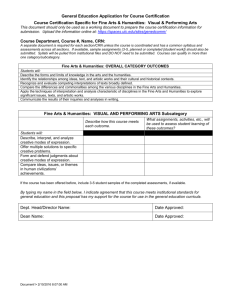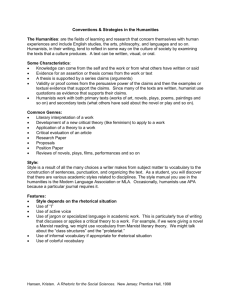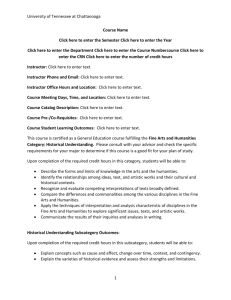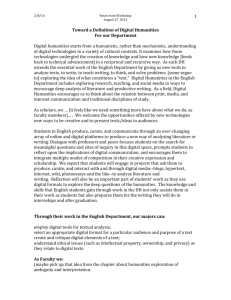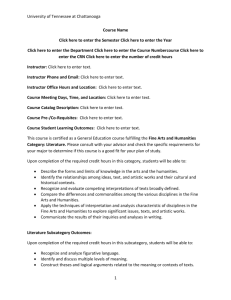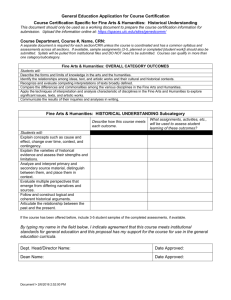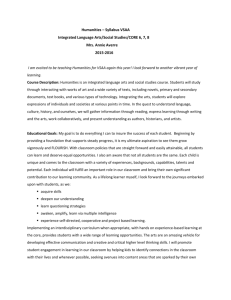Committee on Curriculum, Curricular Policy and Standards Criteria
advertisement
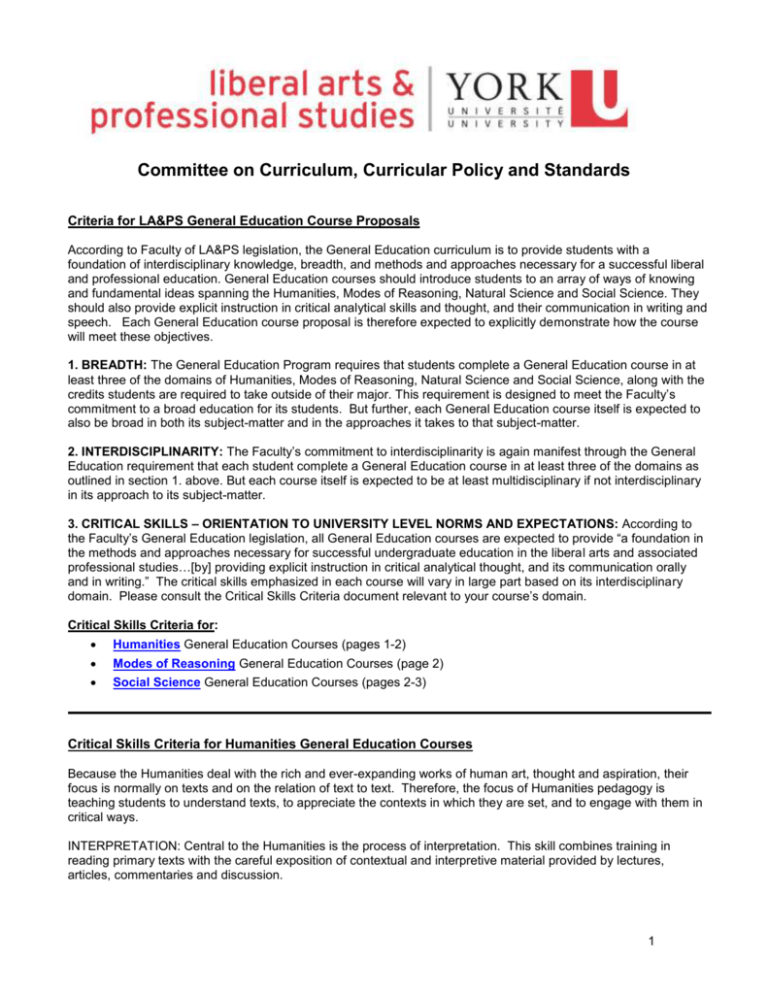
Committee on Curriculum, Curricular Policy and Standards Criteria for LA&PS General Education Course Proposals According to Faculty of LA&PS legislation, the General Education curriculum is to provide students with a foundation of interdisciplinary knowledge, breadth, and methods and approaches necessary for a successful liberal and professional education. General Education courses should introduce students to an array of ways of knowing and fundamental ideas spanning the Humanities, Modes of Reasoning, Natural Science and Social Science. They should also provide explicit instruction in critical analytical skills and thought, and their communication in writing and speech. Each General Education course proposal is therefore expected to explicitly demonstrate how the course will meet these objectives. 1. BREADTH: The General Education Program requires that students complete a General Education course in at least three of the domains of Humanities, Modes of Reasoning, Natural Science and Social Science, along with the credits students are required to take outside of their major. This requirement is designed to meet the Faculty’s commitment to a broad education for its students. But further, each General Education course itself is expected to also be broad in both its subject-matter and in the approaches it takes to that subject-matter. 2. INTERDISCIPLINARITY: The Faculty’s commitment to interdisciplinarity is again manifest through the General Education requirement that each student complete a General Education course in at least three of the domains as outlined in section 1. above. But each course itself is expected to be at least multidisciplinary if not interdisciplinary in its approach to its subject-matter. 3. CRITICAL SKILLS – ORIENTATION TO UNIVERSITY LEVEL NORMS AND EXPECTATIONS: According to the Faculty’s General Education legislation, all General Education courses are expected to provide “a foundation in the methods and approaches necessary for successful undergraduate education in the liberal arts and associated professional studies…[by] providing explicit instruction in critical analytical thought, and its communication orally and in writing.” The critical skills emphasized in each course will vary in large part based on its interdisciplinary domain. Please consult the Critical Skills Criteria document relevant to your course’s domain. Critical Skills Criteria for: Humanities General Education Courses (pages 1-2) Modes of Reasoning General Education Courses (page 2) Social Science General Education Courses (pages 2-3) Critical Skills Criteria for Humanities General Education Courses Because the Humanities deal with the rich and ever-expanding works of human art, thought and aspiration, their focus is normally on texts and on the relation of text to text. Therefore, the focus of Humanities pedagogy is teaching students to understand texts, to appreciate the contexts in which they are set, and to engage with them in critical ways. INTERPRETATION: Central to the Humanities is the process of interpretation. This skill combines training in reading primary texts with the careful exposition of contextual and interpretive material provided by lectures, articles, commentaries and discussion. 1 READING: In order to foster a sophisticated understanding of texts in context, critical skills pedagogy in Humanities focuses on reading “inside the text” and “outside the text”. The first of these objectives relates to experiencing texts in a relatively neutral way; that is before deciding one’s critical stance to a text, one seeks to understand how it works. In reading “outside the text” students enter into the area of interpretation of texts by academic critics or other artists. In this way students come to realize that texts in context are texts in dialogue. WRITING: Central to the Humanities is the skill of putting one’s thinking into writing. Thus Humanities General Education courses normally provide multiple opportunities for students to write in at least one Humanities genre, and to receive extensive feedback on their writing. SPEAKING/LISTENING SKILLS: These skills are usually key elements of the tutorial experience and instruction in them aims to develop interactions that are reflective and considerate. Critical tutorial projects/discussions focus on engaging with course material and learning from peers. RESEARCH: Developing students’ research skills is also an integral component of Humanities General Education courses. This normally involves learning to access interpretive and background material in various ways, and properly acknowledge information and commentary. Critical Skills Criteria for Modes of Reasoning General Education Courses Modes of Reasoning courses teach the reasoning skills often used in the academy and normally fall into three main categories: critical thinking, critical reading and critical writing. CRITICAL THINKING: Modes courses use argument as the core subject matter of their courses and explicitly teach students the skills of argument analysis: identifying, reconstructing and assessing arguments. Particular skills taught include distinguishing arguments from non-arguments, inferring implied premises and conclusions, determining when inferences are valid or invalid, and determining when premises are acceptable or suspect. CRITICAL READING: Critical reading in Modes courses normally involves the application of critical thinking to written texts. Usually then critical reading consists of identifying the specific claims in a text and putting them into question: determining whether they should be accepted, figuring out how they fit together, and assessing whether and to what degree they support the author’s thesis. CRITICAL WRITING: Modes of Reasoning courses teach a model of writing as reasoning. Reasoning can only be carried out through the medium of language, and the academic essay and related species of writing are themselves exercises in reasoning Students are taken through the process of composing an academic essay, applying the skills and concepts acquired through the analysis of arguments. SPEAKING/LISTENING SKILLS: These skills are usually key elements of the tutorial experience and instruction in them aims to develop interactions that are reflective and considerate. Critical tutorial projects/discussions focus on engaging with course material and learning from peers. Critical Skills Criteria for Social Science General Education Courses Critical means analytical, complex, evaluative, interrogatory. Social Science General Education courses normally specify a number of critical skills and create, through readings, lectures, tutorials, projects and graded assignments, experiences which assist students to develop, practice and integrate these skills. CRITICAL THINKING: Thinking denoted as critical is associated with independent intellectual endeavours that examine, rather than accept unconditionally, prevailing concepts and practices. Developing critical thinking means assisting students to learn and refine their powers of reflection, judgment, and argument. CRITICAL READING: Learning to read critically requires developing an appreciation for the variety of purposes in texts as well as developing analytical, interrogatory strategies. To foster critical reading students may be asked to explore theories, hypotheses, methodologies, data, voices, positionality, narrative inclusivity/exclusivity, intersectionality, public policy, and/or equity issues within an interdisciplinary social science context. 2 WRITING SKILLS: Students develop writing skills by practicing the genres and styles appropriate to social science disciplines. Thus, general education courses are typically writing intensive. In addition to the thesis driven essay, students may write reflection pieces highlighting their experiences in relation to course materials, explicate complex theoretical arguments, engage with primary documents and methodologies, examine current public debates, detect minoritized/silenced voices, and/or identify unsubstantiated truth claims. SPEAKING/LISTENING SKILLS: These skills are usually key elements of the tutorial experience and instruction in them aims to develop interactions that are reflective and considerate. Critical tutorial projects/discussions focus on engaging with course material and learning from peers. METHODOLOGY: Methods in social science range widely, from qualitative to quantitative, from interpretivist to positivist, and from observational to experimental. Developing an appreciation of the strengths, limitations, and historical and intellectual contexts of those methods is essential for orientation into social science disciplines. Awareness of the various types and scales of social data is also crucial. 3
